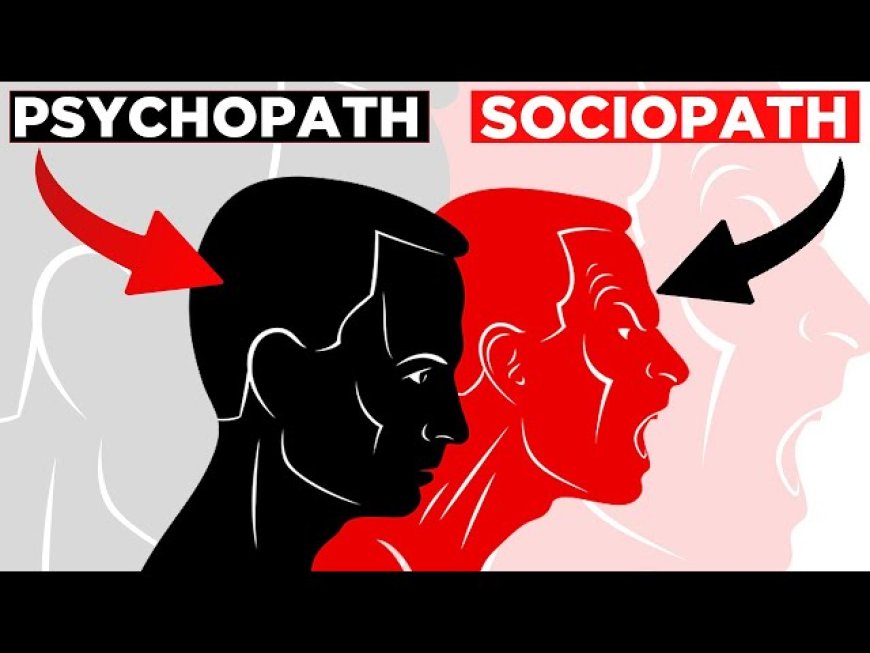Sociopath vs. Psychopath: Unmasking the Real Differences You Need to Know
Understand the core differences between sociopaths and psychopaths. This comprehensive guide from Visible-Web explores traits, behaviors, and causes behind both disorders.

Sociopath vs. Psychopath: Unmasking the Real Differences You Need to Know
The debate of sociopath vs. psychopath often stirs confusion, especially in movies and true crime media. These terms are frequently used interchangeably, but they refer to distinct personality disorders with unique behavioral patterns. While both fall under the umbrella of Antisocial Personality Disorder (ASPD), their characteristics, causes, and social interactions set them apart.
Visible-Web delves into this psychological comparison to clarify myths and provide up-to-date, research-backed insights. By understanding the contrasts between sociopaths and psychopaths, readers gain a better grasp of how these individuals operate in society.
This article not only defines each disorder but also outlines their developmental roots, emotional capacity, and potential danger to others. Whether you're a psychology student or simply curious, this guide offers user-friendly, detailed, and SEO-optimized content you wont find elsewhere.
Sociopath vs. Psychopath: Understanding the Core Distinctions
Although sociopaths and psychopaths are both diagnosed under ASPD, their manifestations differ significantly. The term "sociopath" is often associated with impulsivity and emotional outbursts. These individuals can form attachments but may lack regard for social norms. On the other hand, "psychopaths" are typically more calculated, emotionally detached, and manipulative.
Visible-Web emphasizes that psychopaths are more likely to be charming and deceitful, often blending into society unnoticed. Sociopaths, by contrast, usually display erratic behavior and are easier to detect. Understanding this primary difference is essential to accurately assess their potential danger and psychological makeup.
Emotional Capacity: Sociopaths Feel, Psychopaths Fake
One critical difference in the sociopath vs. psychopath comparison is emotional capacity. Sociopaths, despite their disorder, often experience emotions like anger, jealousy, or guilt. Their feelings may be shallow or short-lived, but they exist. Psychopaths, however, lack genuine emotional depth. Their reactions are typically learned and performed rather than felt.
Psychopaths may mimic emotions to manipulate others, making them particularly dangerous in social or professional settings. Visible-Web explains that while sociopaths may act out emotionally, psychopaths tend to plan their moves with chilling precision. Understanding this gap in emotional processing can help individuals identify warning signs in behavior.
Moral Compass and Guilt: Who Feels It?
Another major difference in the sociopath vs. psychopath debate lies in the capacity for guilt and moral reasoning. Sociopaths often recognize right from wrong, though they may choose to ignore ethical rules when it suits them. They can feel guilt, albeit selectively.
Psychopaths, by contrast, show a profound absence of remorse. Their actions are guided by personal gain, and they rarely experience guilt, even after harming others. According to Visible-Web, this lack of a moral compass makes psychopaths more likely to commit calculated crimes without emotional interference.
Behavioral Patterns and Social Integration
Sociopaths often live on the fringe of society. Their behavior is impulsive, unpredictable, and prone to emotional outbursts. They're less organized and may struggle to maintain long-term employment or relationships. Psychopaths, in contrast, are usually methodical and highly skilled at social manipulation.
Psychopaths can hold jobs, maintain superficial relationships, and even lead successful livesall while hiding their true nature. Visible-Web highlights that while sociopaths are often easier to spot, psychopaths are more dangerous because they blend in so well. Their calm demeanor hides deeper manipulative intentions.
Causes and Development: Nature vs. Nurture
The sociopath vs. psychopath origin story often hinges on the nature vs. nurture debate. Sociopathy is generally believed to be a result of environmental factors such as childhood trauma, neglect, or abuse. This means sociopaths are often made through negative experiences.
Psychopathy, on the other hand, is thought to have genetic or neurological roots. Brain imaging studies show differences in the amygdala and prefrontal cortex of psychopathsareas associated with empathy and impulse control. Visible-Web stresses that understanding these developmental roots can aid in diagnosis and early intervention efforts.
Risk to Society: Who Is More Dangerous?
When comparing sociopath vs. psychopath risk levels, both present dangers, but in different ways. Sociopaths are often reactive and aggressive. Their crimes tend to be spontaneous, driven by emotion or frustration. They might lash out in a fit of rage with little planning.
Psychopaths are more methodical and pose a different kind of threat. They can commit long-term fraud, manipulation, or even violent crimeswithout ever raising suspicion. According to Visible-Web, psychopaths often engage in calculated actions that can cause significant harm over time due to their deceptive nature.
Relationships and Manipulation Styles
In personal relationships, sociopaths tend to struggle with long-term connections. Their volatile nature makes it hard for them to maintain bonds. They may develop attachments, but often these are based on control rather than love. Psychopaths, however, are expert manipulators. They can simulate affection and empathy, making them harder to detect.
Psychopaths use charm and deception to achieve their goals. They're often emotionally detached but will exploit others without guilt. Visible-Web recommends being cautious around individuals who show consistent patterns of deceit, superficial charm, and lack of empathy.
Criminal Behavior and Patterns of Violence
In criminology, understanding the sociopath vs. psychopath dynamic is crucial. Sociopaths are more likely to commit crimes that are disorganized, impulsive, and visible. Their lack of planning often leads to mistakes and arrests. Psychopaths, however, plan meticulously and may commit crimes over long periods without detection.
Visible-Web reports that while both can be violent, psychopaths are more likely to commit strategic and often more heinous crimes. Their unemotional nature allows them to kill or manipulate without remorse. Law enforcement often uses psychological profiling to distinguish between the two for accurate criminal analysis.
Sociopath vs. Psychopath in Pop Culture
Movies and television shows frequently blur the lines between sociopaths and psychopaths. Characters like Dexter Morgan or Hannibal Lecter are commonly labeled as psychopaths due to their calm demeanor and violent tendencies. Meanwhile, sociopaths are often portrayed as hot-headed or unpredictable.
These portrayals can mislead the public, reinforcing stereotypes rather than facts. Visible-Web encourages readers to rely on clinical definitions rather than pop culture myths. A true understanding of sociopath vs. psychopath helps in identifying these behaviors in real-life contexts, improving awareness and mental health literacy.
Can They Be Treated or Rehabilitated?
Treatment options differ significantly between sociopaths and psychopaths. Sociopaths may respond to therapy, especially if treatment begins early. Behavioral therapy, counseling, and support can help some individuals lead more stable lives. Psychopaths, however, rarely seek help and typically don't benefit from conventional therapy.
Because they lack empathy and emotional connection, therapy is often ineffective for psychopaths. Visible-Web stresses that early intervention during childhood or adolescence offers the best chance for managing symptoms. Family involvement, consistent therapy, and a stable environment can reduce long-term risks.
Conclusion: Why Understanding Sociopath vs. Psychopath Matters
In summary, the sociopath vs. psychopath debate involves crucial distinctions in behavior, emotion, cause, and risk. Recognizing these differences is important for mental health professionals, law enforcement, and everyday individuals. Sociopaths are impulsive, emotionally reactive, and shaped by environment. Psychopaths are emotionally detached, calculated, and may be born with neurological differences.
Visible-Web provides this guide to ensure readers are informed with reliable, up-to-date knowledge. By educating ourselves on these complex disorders, we promote safety, awareness, and empathynot just labels.
FAQ Section: Sociopath vs. Psychopath
What is the main difference between a sociopath and a psychopath?
Sociopaths tend to be more emotional and impulsive, while psychopaths are emotionally cold and calculated. Psychopaths often appear charming and manipulative, whereas sociopaths struggle more with social interactions.
Can a sociopath or psychopath love someone?
Sociopaths may form shallow emotional attachments, though often based on control. Psychopaths, on the other hand, usually mimic emotions without actually feeling them.
Are all psychopaths violent?
Not necessarily. While some psychopaths commit violent crimes, others may simply manipulate or deceive for personal gain. Their behavior varies depending on personality and circumstances.
Which is more dangeroussociopath or psychopath?
Psychopaths are generally considered more dangerous due to their ability to hide in plain sight. Their lack of remorse and planning skills make them more capable of long-term harm.
Is treatment possible for sociopaths or psychopaths?
Sociopaths may respond to therapy, especially if diagnosed early. Psychopaths rarely benefit from treatment due to their emotional detachment and lack of motivation for change.











































